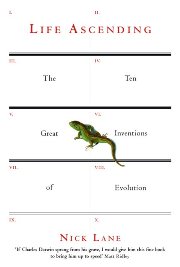
Life Ascending: The Ten Great Inventions of Evolution
by Nick Lane
-Reviewed by Alison Hanson
 As Nick Lane shows in Life Ascending, seeing the inventiveness of nature doesn’t require seeing an intelligent designer. ‘To gain an insight into how all this came about,” he writes of life itself, “is the shared goal of scientists, whatever their religious beliefs.” Lane, a biochemist at University College of London, tells the history of life on Earth and the great innovations that made it possible, from photosynthesis and movement to sex and death.
As Nick Lane shows in Life Ascending, seeing the inventiveness of nature doesn’t require seeing an intelligent designer. ‘To gain an insight into how all this came about,” he writes of life itself, “is the shared goal of scientists, whatever their religious beliefs.” Lane, a biochemist at University College of London, tells the history of life on Earth and the great innovations that made it possible, from photosynthesis and movement to sex and death.
Lane’s story, while neither exhaustive nor chronological, encompasses a rich history of scientific knowledge of ten great inventions, chosen for their impact on the living world, their importance in organisms today, and their iconic status. The book itself evolves from life’s origins to its demise. Lane starts out small: the first four chapters stick to the cellular level. Then, he expands to discuss complex organisms, from the tender new stalks of plants to hulking dinosaurs. Each chapter, too, evolves: Lane shows the progress of scientific knowledge of each invention, from early theories to groundbreaking research to future work needed to face today’s problems, like curing degenerative disease and reducing our dependence on non-renewable energy.
Sex comes early enough in Lane’s arrangement because, of course, not only do birds and bees do it, but plants do it too. “Rooted to the spot, plants are the most implausible of sexual organisms, yet the overwhelming majority of them are exactly that,” Lane writes, adding with characteristic punch, “only dandelions, along with a handful of other species, cock a snook at sex.” Though sex has several disadvantages – disease, a combination of bad genes instead of good ones – Lane shows how it beats cloning for protecting against parasites and mutations.
Lane starts to wrap up his book with a discussion of consciousness, his most abstract and seemingly least-scientific invention. (Bees do consciousness too, to some extent, Lane shows.) Only recently has science managed to tackle the relationship between the brain-that intricately wired hunk of pink and grey – and the mind, the awareness that makes us human, that gives us access to emotions and spirituality. Lane makes the brain-mind connection by explaining recent scientific advances: research into degenerative brain diseases, for instance, that create specific emotional outcomes; or understanding the neural maps and codes that create feelings, and have been developing over millions of generations.
Life Ascending is an engrossing account of the transformation of life through the last four billion years, a portrait that, Lane admits, may or may not be compatible with faith, but is nonetheless worth exploring and celebrating for its own richness.
Excerpt: “Imagine landing a time machine 3 billion years ago in shallow coastal waters. The first thing you notice is that the sky is not blue, but a dull hazy red, a touch reminiscent of Mars. The quiet seas reflect in shades of red. It’s pleasantly warm in this haze, if too misty to see the sun clearly. On land not much catches the eye. The rocks are bare, with damp patches of discoloration here and there, bacteria clinging precariously to their extreme terrestrial outpost. There’s no grass or vegetation of any sort. But marching through the shallow waters are scores of strange domes of greenish rock. Apparently the work of life, the tallest are a metre of so high. A few similar rare structures are still ground in the most remote and inaccessible bays on earth today: stromatolites. Nothing else stirs in the waters. There’s no fish here, no seaweed, no scuttling crabs, no waving anemones. Take off your oxygen mask, and you’ll soon understand why: you’ll suffocate in a few minutes. There’s barely any oxygen, even close to the stromatolites. Yet their blue-green bacteria, cyanobacteria, are already beginning to lace the air with traces of that hazardous gas. In a billion years, their emissions will finally turn out planet vivid greens and blues. And only then will we recognise this bare place as home.”
Further Reading: Power, Sex, Suicide: Mitochondria and the Meaning of Life and The Greatest Show on Earth: The Evidence for Evolution
*Photo courtesy gari.baldi.




Send A Letter To the Editors